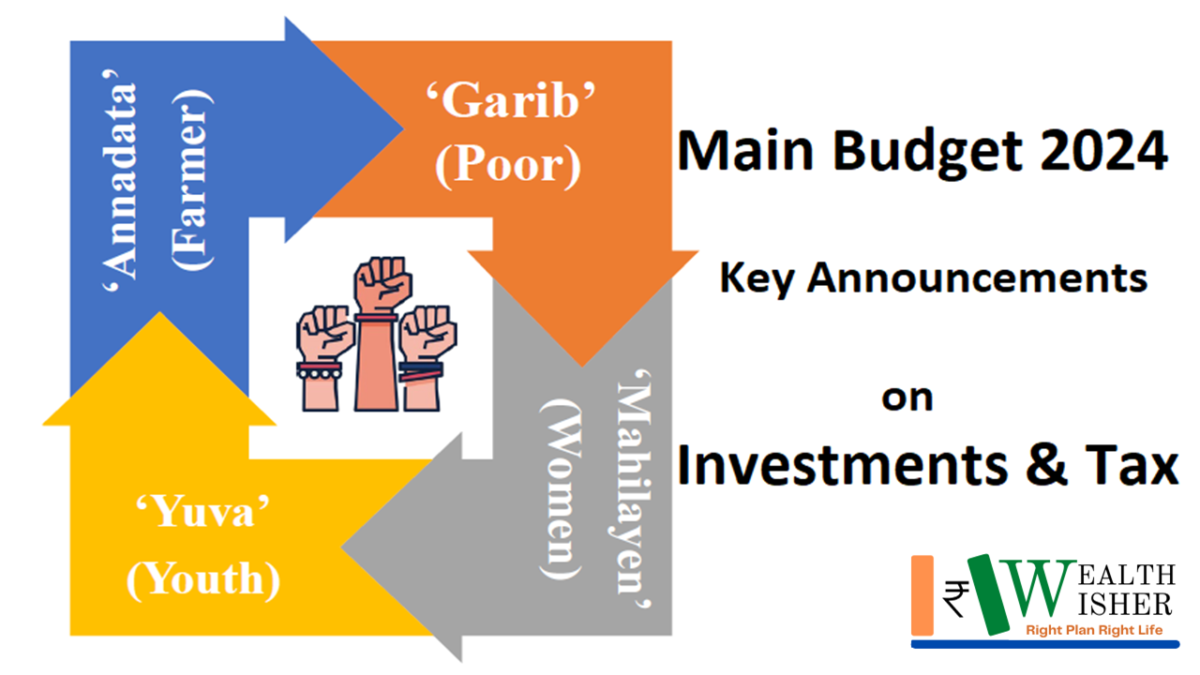Highlights of the Union Budget 2024 Announced on 23 July 2024-
PDF Version of Union Budget 2024 – Download
- NPS-Vatsalya, a plan for contribution by parents and guardians for minors will be started. When the age of majority is reached, the plan can be converted seamlessly into a normal NPS account.
- On the other hand, long-term gains on all financial and non-financial assets will attract a tax rate of 12.5 percent. For the benefit of the lower and middle-income classes, the limit of exemption of capital gains on certain financial assets to ₹ 1.25 lakh per year.
- Since now the rate of 12.5% will prevail as LTCG, the indexation benefit will not exist. A major blow to Property/Real Estate.
- Listed financial assets held for more than a year will be classified as long term, while unlisted financial assets and all non-financial assets will have to be held for at least two years to be classified as long-term. So, for non-equity assets like real estate, gold and other, the duration of long term has been revised from 36 months to 24 months.
- Short-term gains on certain financial assets shall henceforth attract a tax rate of 20 per cent, while that on all other financial assets and all non-financial assets shall continue to attract the applicable tax rate.
- Unlisted bonds and debentures, debt mutual funds and market-linked debentures, irrespective of holding period, however, will attract tax on capital gains at applicable rates.
- Any gains arising out of the sale of units of debt funds will be taxed at 20% without indexation irrespective of the holding period.
Proposed MF Taxation:

- Security Transactions Tax on futures and options of securities is proposed to be increased to 0.02 percent and 0.1 percent respectively.
- Gold and silver ETFs to gain traction. The government has proposed reduction of custom duty on gold and silver to 6%. So far, it was 10%.
- No TDS on dividend reinvestment: There will be no TDS on repurchase of units by mutual funds. This will benefit investors investing in dividend reinvestment plans.
- Tax income received on the buyback of shares will be taxed in the hands of the recipient.
- To improve social security benefits, the deduction of expenditure by employers towards NPS is proposed to be increased from 10 to 14 percent of the employee’s salary.
- Indian professionals working in multinationals get ESOPs and invest in social security schemes and other movable assets abroad. Non-reporting of such small foreign assets has penal consequences under the Black Money Act. Such non-reporting of movable assets up to ₹ 20 lakh is proposed to be de-penalised.
- The standard deduction for salaried employees is proposed to be increased from ₹50,000/- to ₹75,000/-.
- Deduction on family pension for pensioners is proposed to be enhanced from ₹ 15,000/- to ₹ 25,000/-.
New Tax structure under New Tax Regime:
As a result of these changes, a salaried employee in the new tax regime stands to save up to ₹ 17,500/– in income tax.

As a result of these changes, a salaried employee in the new tax regime stands to save up to ₹ 17,500/- in income tax.

- It is proposed that retail schemes and Exchange Traded Funds in IFSC, shall enjoy tax exemptions along similar lines as available to specified funds.
TDS will be reduced in many cases in the Main Budget 2024:

- The corporate tax rate on foreign companies is reduced to 25%.
- Govt announces that angel tax to be abolished.
- It is proposed that income from letting out of a house or part of the house by the owner, shall not be charged under the head ‘profits and gains of business or profession’. It will be chargeable to tax under the head ‘income from house property’ only.
- Inclusion of taxes withheld outside India for purposes of calculating total income. It is proposed to provide that income tax paid outside India by way of the deduction is deemed to be income received to compute the income of the assess.
- The government will review the existing income tax provisions and new pension scheme (NPS). The committee will submit their report within 6 months. This indicates that we may see changes in NPS and tax norms in the next year’s budget.
Please note that we have interpreted these norms based on our research. We request you to not to consider as tax advice and wait for some more time for further clarification.








